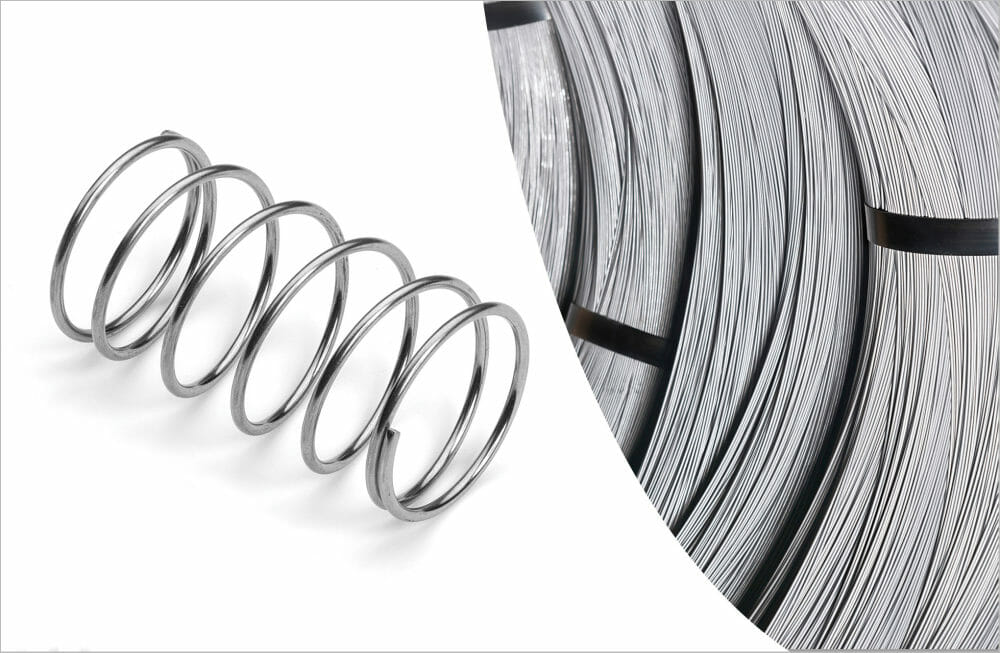Normal alloy steels have various elements added in small quantities to improve their material strength, hardenability, temperature resistance, corrosion resistance, and other properties and any level of carbon can be combined with these alloying elements.
For example, Chromium is added to improve strength, ductility, toughness, wear resistance and hardenability, while Nickel is added to improve strength without loss of ductility, and it also enhances case hardenability. Molybdenum, used in combination with nickel and/or chromium, adds hardness, reduces brittleness, and increases toughness.
Many other alloys in various combinations are used to achieve specific properties and it is found that the ultimate tensile strength of these “normal” alloy steels can vary from about 80 to 300 kpsi depending on the alloying elements and heat treatment.
However, some extreme applications call for very special alloys derived from the most advanced aerospace and military development programs in order to deal with the most harsh conditions for which Lee Spring offers very high performance nickel and cobalt “super” alloys.
These materials with high alloy content are rightly referred to as super alloys or exotic alloys since they offer greatly enhanced performance properties including excellent strength and durability, and resistance to oxidation, corrosion and deformation at high temperatures or under extreme pressure.
Due to these unusual properties, super alloys make the best spring materials for ultra-demanding working conditions, which can be encountered across various industry sectors, including the Automotive, Marine and Aerospace sectors as well as oil and gas extraction, thermal processing, petrochemical processing and power generation.
Super alloy springs can be used in a number of severe conditions including extreme high or low temperatures, under great pressure and exposed to outdoor conditions, including extreme weather. Springs not made from super alloys, if used in these circumstances, are at risk of becoming deformed or damaged, as they will not be strong enough to withstand heavy impact or harsh conditions, or a combination of both.
“The reliability and longevity of a finished product hinges on selection of the correct material to meet specific requirements of the application” says Darren Eyre, Technical Specialist at Lee Spring. “Stainless steel, for example, is tough and corrosion resistant, but it does not offer the properties that are required in order to withstand extreme heat, so is likely to distort when exposed to high temperatures. It is essential to clearly understand the environment that the spring is likely to be used in.”
Inconel alloys for example are available in different grades (600, X-750 and 718) and are suitable for use in valves, pumps or actuators, for applications that involve high pressure and high temperatures, for example in nuclear power stations, gas turbines, rocket engines and hot air ducting or for drilling on offshore platforms.
Inconel X-750 nickel-chromium alloy is commonly used in high temperature and corrosive environments. Two tempers exist, the most common is precipitation heat treated to a spring temper condition. In this state, it has temperature resistance to 700° F. The National Association of Corrosion Engineers (NACE) approves this hard temper to Specification MR-01-75 (Rc 50 maximum) for spiral retaining rings and wave/compression springs. #1 temper has a lower tensile strength but provides temperature protection to 1000° F. Rings and springs manufactured from Inconel have a blue/silver-grey colour and exhibit no magnetism. Nimonic and Hastelloy alloys are also corrosion resistant and are suitable for applications involving high pressure and high temperature.
“Springs required to operate in ‘harsh environments’ could mean anything from underwater, contending with corrosion from saltwater, or contact with ‘sour’ gas from drilling down under the sea bed, to 35,000 feet up in the air battling low temperatures and high wind speeds” says Nick Lungley, Applications Engineer at Lee Spring. “Offshore applications require equipment that is capable of ‘braving the elements’, and some manufacturing or furnace situations involve extremely low or extremely high temperatures. Other applications can involve the equipment being subjected to very corrosive substances.”
For applications up to 1000° F, A286 alloy exhibits similar properties to Inconel X-750 spring temper. Its spring temper condition is obtained by precipitation hardening. It also exhibits no magnetism and has a blue/silver-grey colour.
The nickel-cobalt alloy, MP35N, consists of nickel and cobalt and is ideally suited to marine and sub-sea applications due to its resistance to hydrogen sulphide, salt water and mineral acids, which can have a highly corrosive effect on most metals. Monel is a high performance nickel based alloy that incorporates copper and iron. It is corrosion resistant and acid resistant, so is suitable for marine applications as well as applications involving acids and other highly corrosive substances. It exhibits high strength, toughness, ductility and outstanding resistance to corrosion.
At the very top end of spring performance we find Elgiloy which is a truly exotic alloy mix known for its excellent resistance to corrosive environments, elevated temperature resistance and high strength. Elgiloy exhibits no-magnetism and is blue/brown in colour as a result of heat treatment. It offers a good solution for extreme environments accompanied by mechanical properties similar to high carbon spring steel (music wire). The mechanical properties of Elgiloy are often superior to stainless steel and other nickel alloys. It may also be considered in some medical applications and can often be used in lieu of titanium where it offers several advantages. Elgiloy offers excellent bio-compatible characteristics and can be used from extreme low temperatures up to +450°C. Typical uses include watch and instrument springs, medical and oil industry.
Lee Spring offers standard springs in some super alloys and a custom engineering service for springs up to 19mm diameter in normal alloys, and nickel and cobalt super alloys including Inconel, Nimonic, Hastelloy, Monel, Elgiloy and MP35N. Other alloys available include stainless steel, phosphor bronze and beryllium copper.
Further information on Lee Spring products can be found on their website – www.leespring.co.uk or follow them on twitter – https://twitter.com/leespringuk.








